Solar Panel Repair & Maintenance Scranton
Find top Solar Panel Maintenance & Repair in Scranton
Get 3 FREE Solar Panel Troubleshooting quotes for your project today! Compare profiles, reviews, accreditations, portfolio, etc... and choose the best service.

Onyx Solar Group LLC
C/ Río Cea 1, 46, Ávila, 05004, USOnyx Solar is the world’s leading manufacturer of transparent photovoltaic (PV) glass for buildings. Onyx Solar uses photovoltaic glass as a material for building.
- Services
- Why Us?
- Accreditations
- Our Team
- Testimonials
- Gallery
Get Quote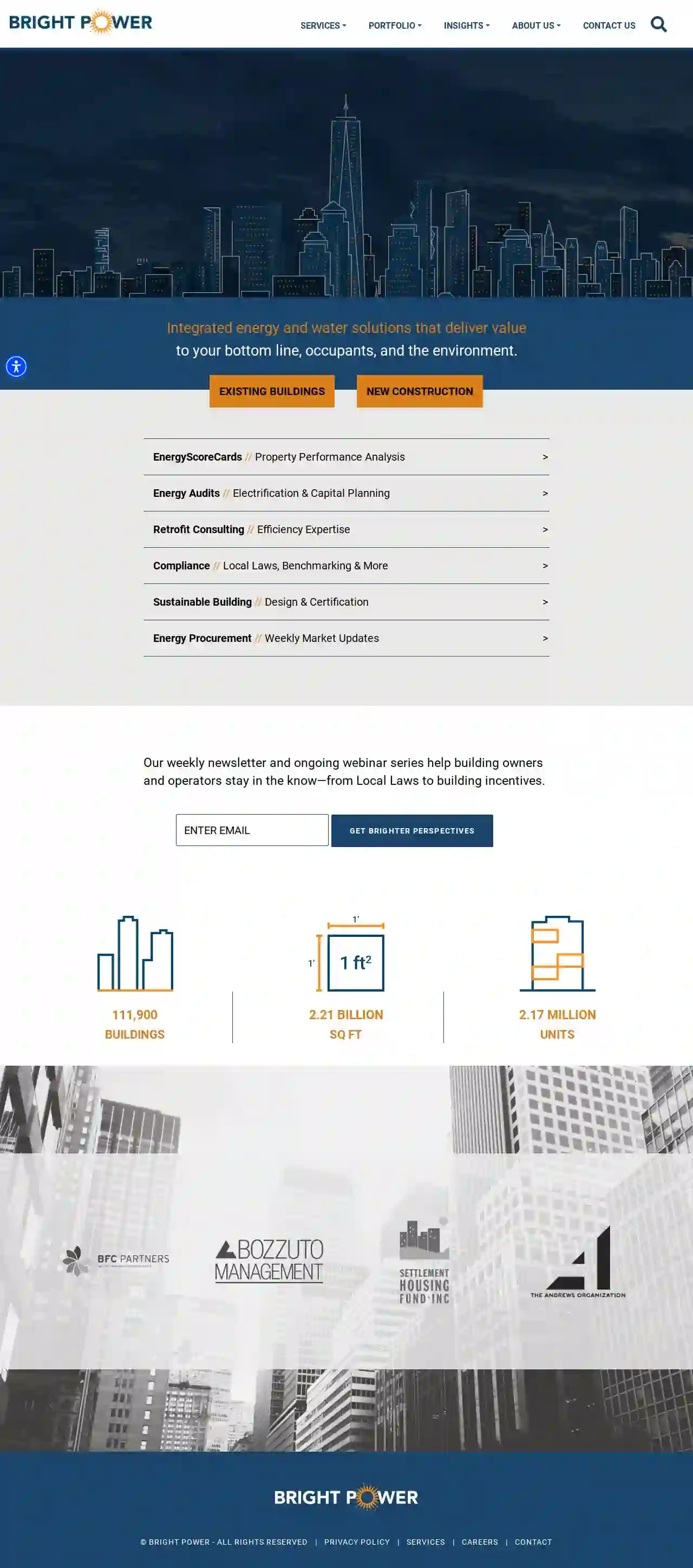
Bright Power
3.337 reviewsNew York, NY, USA, 123 Broadway, 10001, USBright Power is a leading provider of energy and water management solutions, offering comprehensive services including ongoing energy management, benchmarking, compliance with energy laws, energy supply purchasing, and more. With a focus on sustainability and value, Bright Power helps building owners and operators navigate the complex world of energy and water management.
- Services
- Why Us?
- Accreditations
- Our Team
- Testimonials
- Gallery
Get Quote
Fusion Solar Energy
4.332 reviewsEdison, NJ, 1059 King Georges Post Road, 08837, USAt Fusion Solar Energy, we believe in the power of clean, renewable energy to transform lives and communities. Founded with a vision to make sustainable energy accessible and affordable for all, we are dedicated to providing innovative solar solutions that empower individuals, businesses, and organizations to embrace a greener future.
- Services
- Why Us?
- Accreditations
- Our Team
- Testimonials
- Gallery
Get Quote
PowerLutions Solar
51 reviewsLakewood, NJ, 216 River Avenue, 08701, USPowerLutions Solar Company is a NABCEP Certified-Led, full service solar installer in NJ, NY, FL, CT & MA. They offer a 1:1 project experience, overseen by one of their dedicated solar specialists. Their services include residential and commercial solar solutions, solar installation, solar financing, and more. They are authorized and recognized by several organizations and offer solar incentives to their customers.
- Services
- Why Us?
- Accreditations
- Our Team
- Testimonials
- Gallery
Get Quote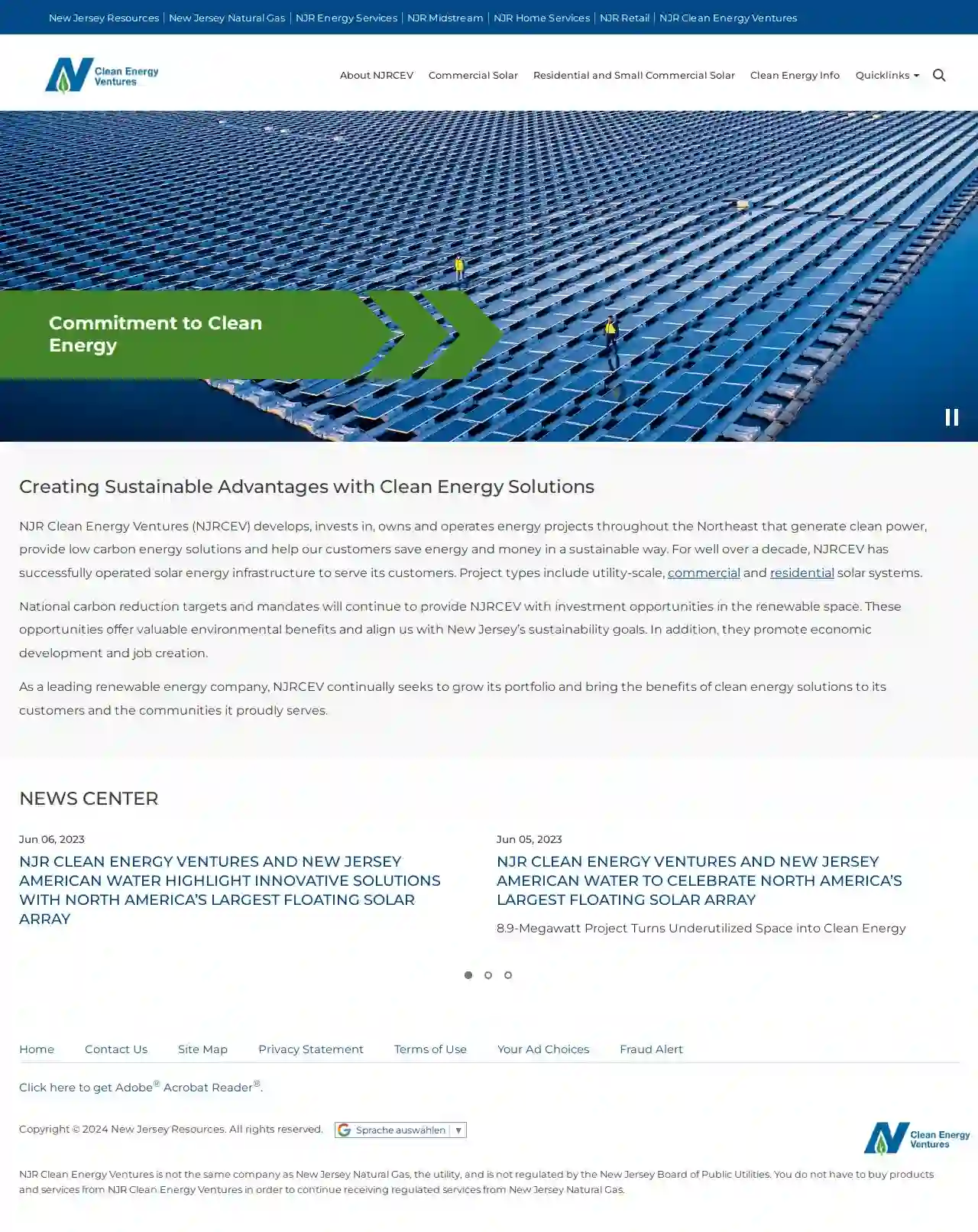
NJR Clean Energy Ventures
13 reviewsWall, NJ, 1415 Wyckoff Road, 07753, USNJR Clean Energy Ventures (NJRCEV) is a leading renewable energy company that develops, invests in, owns, and operates energy projects throughout the Northeast. For over a decade, NJRCEV has successfully operated solar energy infrastructure to serve its customers. The company's commitment to clean energy solutions aligns with New Jersey's sustainability goals and promotes economic development and job creation.
- Services
- Why Us?
- Accreditations
- Our Team
- Testimonials
- Gallery
Get Quote
CVE North America
51 reviews123 Main St, Suite 100, Cityville, 12345, USCVE North America is an independent power producer, delivering clean, renewable energy to our customers. We develop, finance and build solar plants to own and operate for the long term. Our relationship with landowners and local governments is paramount, as we work together to bring clean energy to local households and businesses. Our solar solutions include ground mounted solar, solar rooftops, solar solutions for farmers, Halo Community Solar, and solar carports. We are committed to sustainability and fostering positive societal values beyond the environmental benefits of our projects.
- Services
- Why Us?
- Accreditations
- Our Team
- Testimonials
- Gallery
Get Quote
Advanced Renewable Solutions - Solar 4 South Jersey
4.949 reviewsBellmawr, NJ, United States, 08031, USAdvanced Renewable Solutions is a leading solar service provider in South Jersey, offering a range of services including solar installations, engineering, preventative services, and landscaping. With a focus on aesthetics and quality, ARS aims to provide sustainable energy solutions for a sustainable future. The company is dedicated to providing professional and reliable service to meet all client needs.
- Services
- Why Us?
- Accreditations
- Our Team
- Testimonials
- Gallery
Get Quote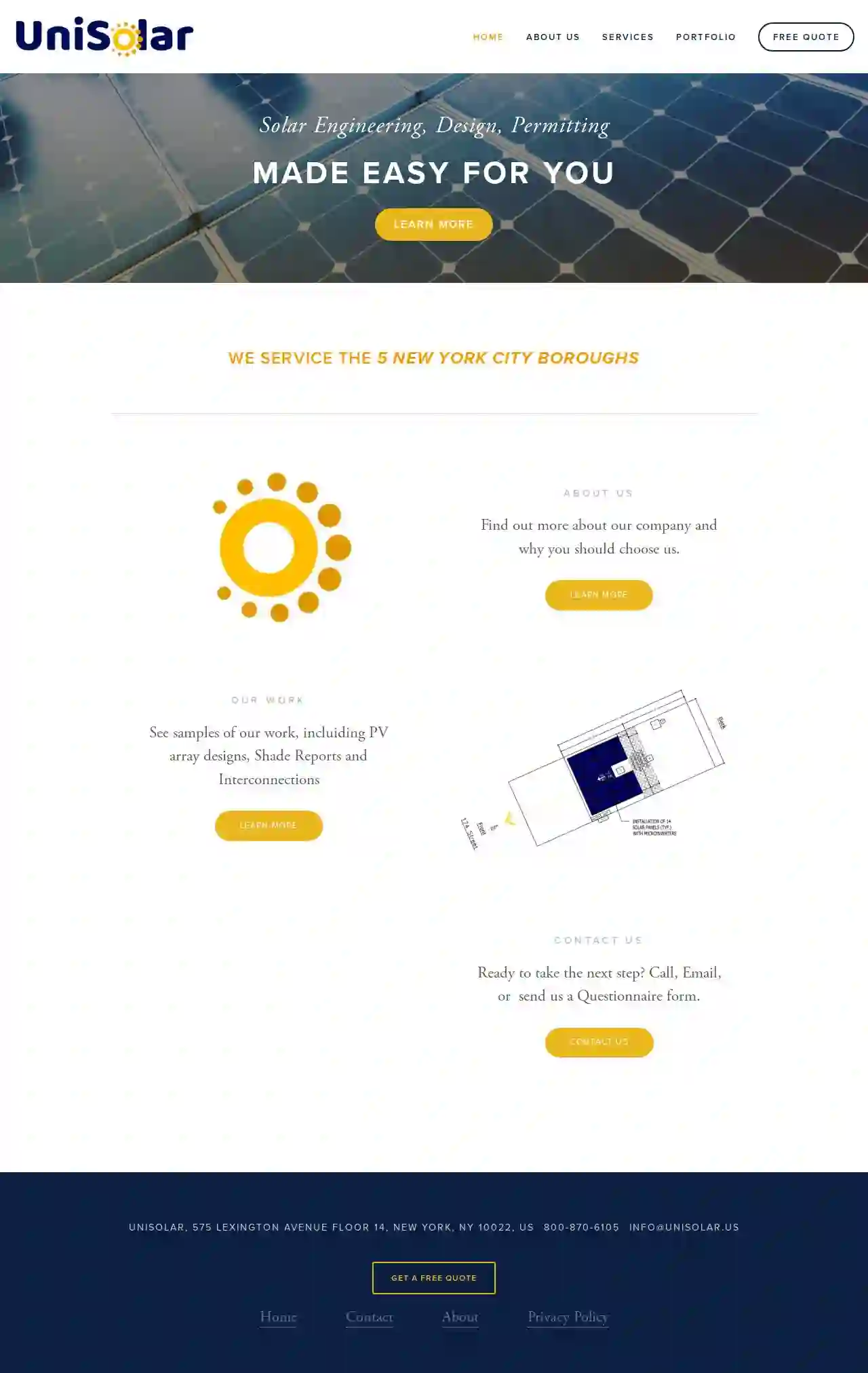
UniSolar
51 reviewsNew York, NY, 575 Lexington Ave. Fl. 14, 10022, USUniSolar is a leading provider of solar engineering, design, and permitting services. Our team of experts is dedicated to making the process easy for our clients. We service the 5 New York city boroughs and offer a range of services including PV array designs, shade reports, and interconnections. Our goal is to provide high-quality services that meet our clients' needs and exceed their expectations.
- Services
- Why Us?
- Accreditations
- Our Team
- Testimonials
- Gallery
Get Quote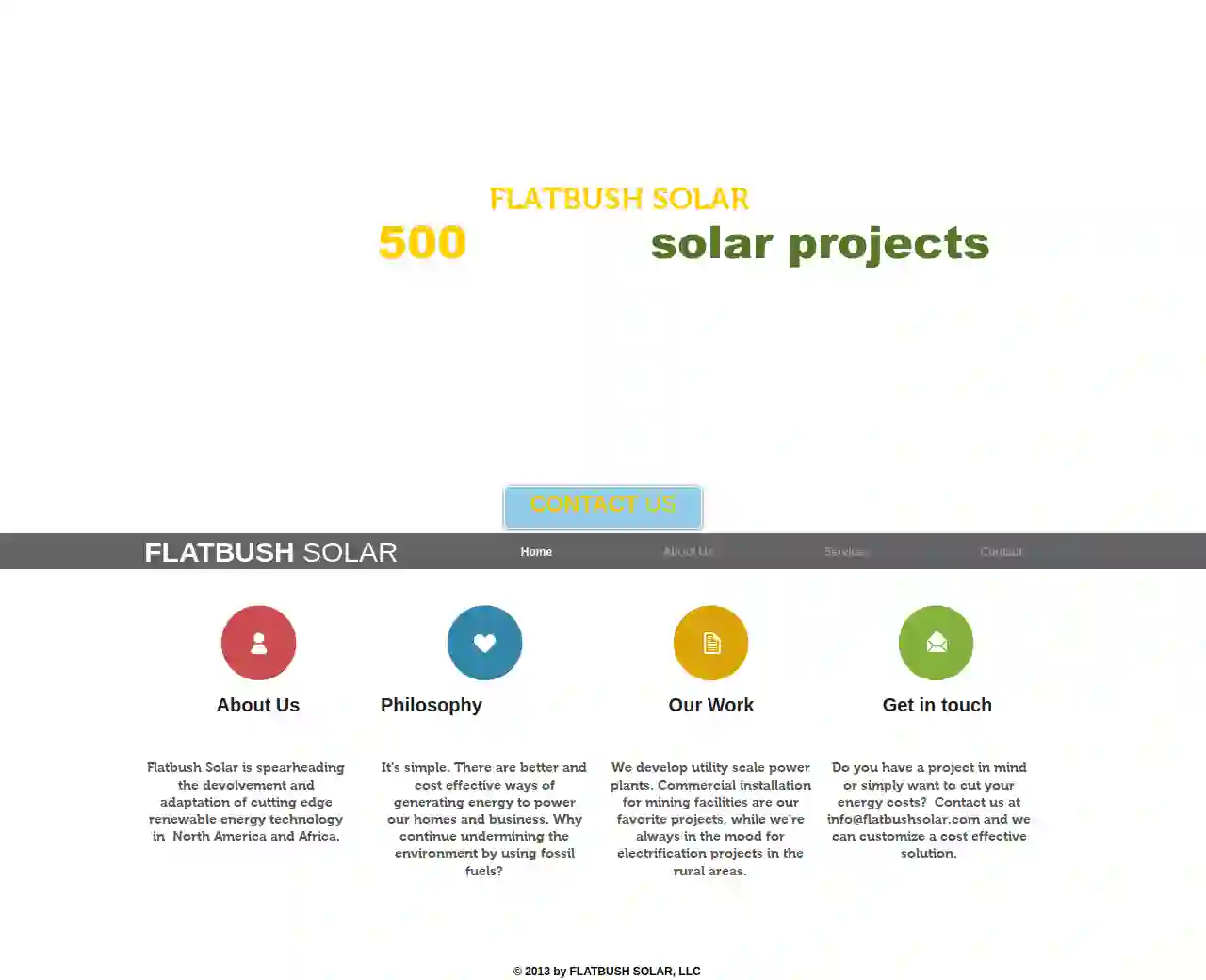
FLATBUSH SOLAR, LLC
York, USFlatbush Solar is a leading developer of renewable energy technology in North America and Africa. They specialize in utility-scale power plants, commercial installations for mining facilities, and rural electrification projects. Their mission is to provide cost-effective energy solutions while promoting environmental sustainability.
- Services
- Why Us?
- Gallery
Get Quote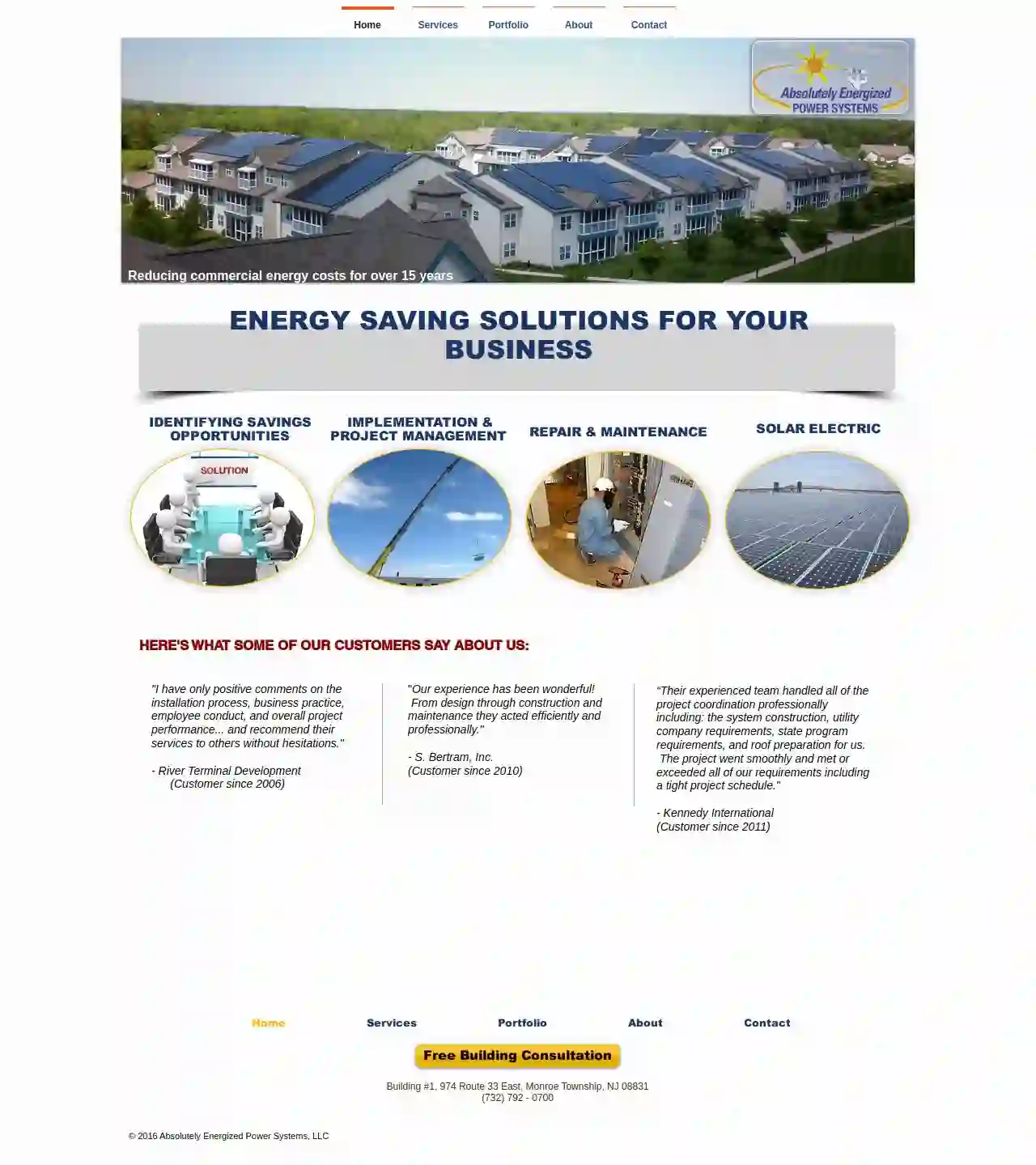
Absolutely Energized Solar Electric, Inc.
3.73 reviewsBuilding #1, 974 Route 33 East, Monroe Township, NJ 08831, 08831, USAbsolutely Energized Power Systems, LLC is a company dedicated to reducing commercial energy costs for over 15 years. They offer services such as identifying energy savings, project management and implementation, repair and maintenance, and commercial solar electric. Their portfolio includes various solar electric projects, and they have received positive feedback from customers such as River Terminal Development, S. Bertram, Inc., and Kennedy International.
- Services
- Why Us?
- Testimonials
- Gallery
Get Quote
Over 4,210+ Solar Businesses onboarded
Our solar experts operate in Scranton and surrounding areas!
SolarCompaniesHub has curated and vetted the Best Solar Installers arround Scranton. Find a trustworthy contractor today.
Solar Panel Repair & Maintenance FAQ
- Microinverters or Power Optimizers: These devices can mitigate the effects of shading by optimizing the output of each individual panel.
- Strategic Panel Placement: A qualified installer will assess your roof and design a system layout that minimizes potential shading from trees, buildings, or other obstructions.
- Choose a Cool, Overcast Day: Avoid cleaning panels in direct sunlight or when they are hot, as the cleaning solution can dry too quickly and leave streaks.
- Use a Soft Brush or Sponge: Avoid abrasive materials that could scratch the panels. A soft-bristled brush or a non-abrasive sponge is ideal.
- Use Mild Soap and Water: A gentle cleaning solution of mild soap (dish soap) and water is usually sufficient. Avoid using harsh chemicals or detergents.
- Rinse Thoroughly: Rinse the panels thoroughly with clean water to remove any soap residue.
- Safety First: Be careful when working on your roof. Use a sturdy ladder and consider wearing a safety harness. If you are uncomfortable working on your roof, it's best to hire a professional.
- Regular Cleaning: Keep the panels clean to ensure optimal sun exposure and energy production.
- Preventative Maintenance: Schedule annual inspections by a qualified technician to catch potential problems early.
- Address Issues Promptly: If you notice any signs of damage or malfunction, contact a repair specialist immediately.
- Minimize Shading: Keep trees and vegetation trimmed to prevent shading.
- Monitor Performance: Regularly check your monitoring system (if available) to track energy production and identify any performance issues.
- Protect from Extreme Weather: While solar panels are designed to withstand most weather conditions, it's a good idea to protect them from extreme events, like hailstorms, if possible.
- Panel Replacement: Replacing a single damaged panel can cost [estimated range].
- Inverter Repair or Replacement: Repairing or replacing an inverter can cost [estimated range].
- Wiring Repair: Fixing faulty wiring connections typically costs [estimated range].
- Troubleshooting and Diagnostics: The cost for a professional to diagnose the problem can range from [estimated range].
How does shading affect solar panel efficiency?
Can I clean my solar panels myself?
What are some tips for extending the life of my solar panels?
How much does it cost to repair solar panels?
How does shading affect solar panel efficiency?
- Microinverters or Power Optimizers: These devices can mitigate the effects of shading by optimizing the output of each individual panel.
- Strategic Panel Placement: A qualified installer will assess your roof and design a system layout that minimizes potential shading from trees, buildings, or other obstructions.
Can I clean my solar panels myself?
- Choose a Cool, Overcast Day: Avoid cleaning panels in direct sunlight or when they are hot, as the cleaning solution can dry too quickly and leave streaks.
- Use a Soft Brush or Sponge: Avoid abrasive materials that could scratch the panels. A soft-bristled brush or a non-abrasive sponge is ideal.
- Use Mild Soap and Water: A gentle cleaning solution of mild soap (dish soap) and water is usually sufficient. Avoid using harsh chemicals or detergents.
- Rinse Thoroughly: Rinse the panels thoroughly with clean water to remove any soap residue.
- Safety First: Be careful when working on your roof. Use a sturdy ladder and consider wearing a safety harness. If you are uncomfortable working on your roof, it's best to hire a professional.
What are some tips for extending the life of my solar panels?
- Regular Cleaning: Keep the panels clean to ensure optimal sun exposure and energy production.
- Preventative Maintenance: Schedule annual inspections by a qualified technician to catch potential problems early.
- Address Issues Promptly: If you notice any signs of damage or malfunction, contact a repair specialist immediately.
- Minimize Shading: Keep trees and vegetation trimmed to prevent shading.
- Monitor Performance: Regularly check your monitoring system (if available) to track energy production and identify any performance issues.
- Protect from Extreme Weather: While solar panels are designed to withstand most weather conditions, it's a good idea to protect them from extreme events, like hailstorms, if possible.
How much does it cost to repair solar panels?
- Panel Replacement: Replacing a single damaged panel can cost [estimated range].
- Inverter Repair or Replacement: Repairing or replacing an inverter can cost [estimated range].
- Wiring Repair: Fixing faulty wiring connections typically costs [estimated range].
- Troubleshooting and Diagnostics: The cost for a professional to diagnose the problem can range from [estimated range].